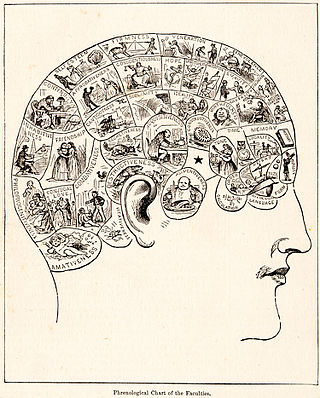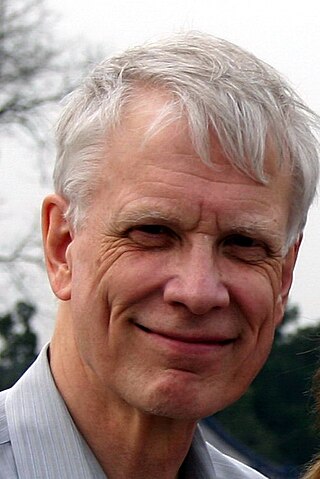
Extrasensory perception or ESP, also called sixth sense, is a claimed paranormal ability pertaining to reception of information not gained through the recognized physical senses, but sensed with the mind. The term was adopted by Duke University botanist J. B. Rhine to denote psychic abilities such as intuition, telepathy, psychometry, clairvoyance, clairaudience, clairsentience, empathy and their trans-temporal operation as precognition or retrocognition.

Pseudoscience consists of statements, beliefs, or practices that claim to be both scientific and factual but are incompatible with the scientific method. Pseudoscience is often characterized by contradictory, exaggerated or unfalsifiable claims; reliance on confirmation bias rather than rigorous attempts at refutation; lack of openness to evaluation by other experts; absence of systematic practices when developing hypotheses; and continued adherence long after the pseudoscientific hypotheses have been experimentally discredited.

The Skeptic's Dictionary is a collection of cross-referenced skeptical essays by Robert Todd Carroll, published on his website skepdic.com and in a printed book. The skepdic.com site was launched in 1994 and the book was published in 2003 with nearly 400 entries. As of January 2011 the website has over 700 entries. A comprehensive single-volume guides to skeptical information on pseudoscientific, paranormal, and occult topics, the bibliography contains some seven hundred references for more detailed information. According to the back cover of the book, the on-line version receives approximately 500,000 hits per month.

Holocaust denial is an antisemitic conspiracy theory that asserts that the Nazi genocide of Jews, known as the Holocaust, is a myth, fabrication, or exaggeration. Holocaust denial involves making one or more of the following false statements:
Scientific skepticism or rational skepticism, sometimes referred to as skeptical inquiry, is a position in which one questions the veracity of claims lacking empirical evidence. In practice, the term most commonly references the examination of claims and theories that appear to be beyond mainstream science, rather than the routine discussions and challenges among scientists. Scientific skepticism differs from philosophical skepticism, which questions humans' ability to claim any knowledge about the nature of the world and how they perceive it, and the similar but distinct methodological skepticism, which is a systematic process of being skeptical about the truth of one's beliefs.

Michael Brant Shermer is an American science writer, historian of science, executive director of The Skeptics Society, and founding publisher of Skeptic magazine, a publication focused on investigating pseudoscientific and supernatural claims. The author of over a dozen books, Shermer is known for engaging in debates on pseudoscience and religion in which he emphasizes scientific skepticism.

Duane Tolbert Gish was an American biochemist and a prominent member of the creationist movement. A young Earth creationist, Gish was a former vice-president of the Institute for Creation Research (ICR) and the author of numerous publications about creation science.

Ray Hyman is a Professor Emeritus of Psychology at the University of Oregon in Eugene, Oregon, and a noted critic of parapsychology. Hyman, along with James Randi, Martin Gardner and Paul Kurtz, is one of the founders of the modern skeptical movement. He is the founder and leader of the Skeptic's Toolbox. Hyman serves on the Executive Council for the Committee for Skeptical Inquiry.
A debunker is a person or organization that exposes or discredits claims believed to be false, exaggerated, or pretentious. The term is often associated with skeptical investigation of controversial topics such as UFOs, claimed paranormal phenomena, cryptids, conspiracy theories, alternative medicine, religion, or exploratory or fringe areas of scientific or pseudoscientific research.

Penn & Teller: Bullshit! is an American documentary comedy television series hosted by magician and skeptic duo Penn and Teller that aired from 2003 to 2010 on the premium cable channel Showtime.
The Skeptics Society is a nonprofit, member-supported organization devoted to promoting scientific skepticism and resisting the spread of pseudoscience, superstition, and irrational beliefs. The Skeptics Society was co-founded by Michael Shermer and Pat Linse as a Los Angeles-area skeptical group to replace the defunct Southern California Skeptics. After the success of its magazine, Skeptic, introduced in early 1992, it became a national and then international organization. The stated mission of Skeptics Society and Skeptic magazine "is the investigation of science and pseudoscience controversies, and the promotion of critical thinking."
Rosemary Altea is a British author who describes herself as a medium and healer. She has appeared on various programs, including Larry King Live, The Oprah Winfrey Show, and featured in the series premiere of Penn & Teller: Bullshit! alongside mentalist Mark Edward. She has written six books and claims to have a "healing foundation".

Flim-Flam! Psychics, ESP, Unicorns, and Other Delusions is a 1980 book by magician and skeptic James Randi about paranormal, occult, and pseudoscience claims. The foreword is by science fiction author Isaac Asimov. Randi explores topics which he says that scientists and the media are too willing to promote without skepticism and proper expertise.

Why Darwin Matters: The Case Against Intelligent Design is a 2006 book by Michael Shermer, an author, publisher, and historian of science. Shermer examines the theory of evolution and the arguments presented against it. He demonstrates that the theory is very robust and is based on a convergence of evidence from a number of different branches of science. The attacks against it are, for the most part, very simplistic and easily demolished. He discusses how evolution and other branches of science can coexist with religious beliefs. He describes how he and Darwin both started out as creationists and how their thinking changed over time. He examines current attitudes towards evolution and science in general. He finds that in many cases the problem people have is not with the facts about evolution but with their ideas of what it implies.

Denying History: Who Says the Holocaust Never Happened and Why Do They Say It? is a 2002 book about Holocaust denial by Michael Shermer and Alex Grobman with collaboration of Arthur Hertzberg.

James E. Alcock is a Canadian educator. He has been a Professor of Psychology at York University (Canada) since 1973. Alcock is a noted critic of parapsychology and is a Fellow and Member of the Executive Council for the Committee for Skeptical Inquiry. He is a member of the Editorial Board of The Skeptical Inquirer, and a frequent contributor to the magazine. He has also been a columnist for Humanist Perspectives Magazine. In 1999, a panel of skeptics named him among the two dozen most outstanding skeptics of the 20th century. In May 2004, CSICOP awarded Alcock CSI's highest honor, the In Praise of Reason Award. Alcock is also an amateur magician and is a member of the International Brotherhood of Magicians. As of 2020, he is currently on leave from York University.
In psychology, anomalistic psychology is the study of human behaviour and experience connected with what is often called the paranormal, with few assumptions made about the validity of the reported phenomena.

Donald Ross Prothero is an American geologist, paleontologist, and author who specializes in mammalian paleontology and magnetostratigraphy, a technique to date rock layers of the Cenozoic era and its use to date the climate changes which occurred 30–40 million years ago. He is the author or editor of more than 30 books and over 300 scientific papers, including at least 5 geology textbooks.

Paranormality: Why we see what isn't there is a 2011 book about the paranormal by psychologist and magician Richard Wiseman. Wiseman argues that paranormal phenomena such as psychics, telepathy, ghosts, out-of-body experiences, prophesy and more do not exist, and explores why people continue to believe, and what that tells us about human behavior and the way the brain functions. Wiseman uses QR codes throughout the book, which link to YouTube videos as examples and as experiments the reader can participate in to further explain the phenomena. Because of a cautious American publishing market, it was only available in America through Kindle. Paranormality was awarded the Center for Inquiry's Robert P. Balles award for 2011.

The Psychology of the Occult is a 1952 skeptical book on the paranormal by psychologist D. H. Rawcliffe. It was later published as Illusions and Delusions of the Supernatural and the Occult (1959) and Occult and Supernatural Phenomena (1988) by Dover Publications. Biologist Julian Huxley wrote a foreword to the book.















